- Home
- Jane Arbor
The Other Miss Donne Page 2
The Other Miss Donne Read online
Page 2
‘When I can. She’s only nineteen, three years younger than I am, and she hasn’t been—around so much.’
‘But still not so young nor so little “around” that she wasn’t above absconding with my brother and getting married without consulting you.’
Carey bit her lip. ‘I imagine she—they—must have been rather desperate. And perhaps being in love makes people more ruthless than—’
She broke off, daunted by Randal Quest’s sceptical glance as he queried smoothly, ‘Speaking from your own experience of the love-bemused state?’ He sat back, squaring his shoulders against the carved chair-back. ‘Meanwhile, having been thoroughly conned by your sister, what do you propose to do about it, Miss Donne?’
Carey echoed, ‘Conned?’
He shrugged. ‘Too strong? Don’t forget, at my brother’s hands, I’ve been conned too. However, what are your immediate plans?’
‘Why, I shall go to Ibiza, I suppose. Miss Corel said you have their address there?’
His nod confirmed that. ‘But with what purpose when you get there? Considering the guilt-complex your sister must have towards you, do you suppose you’re going to be welcome?’
Carey drew a long breath. ‘I don’t know. That is, we’ve always been so close that my instinct is to go to her. But perhaps you’re right, and she may even have gone before I could get here because she couldn’t face me. I—don’t know.’ Carey heard in her tone an irresolution which she despised as she added, ‘You see, I’m completely without any—guidelines. No conflict like this has ever arisen between us before.’
‘And as you say yourself, there’s no accounting for how this thing called love can taint other relationships. And so, if you take my advice, which you probably won’t, you won’t follow your sister up just now. You’ll leave her alone, as I mean to ignore my brother until I see fit to make contact again.’
Carey stared across the desk in dismay. ‘Ignore her? I couldn’t do that!’
‘All right. Keep in touch by letter or telephone if you must. But if you go to her in the role of a nurse who has been supplanted, you could well live to regret it. In the meantime,’ he added with an air of considering that argument closed, ‘how is it you found yourself free to follow her here at short notice? Doesn’t your own job continue?’
‘Not my last one. I’m making a change. I’ve done two and a half years at it, and after my latest trip, I’m not going back to sea.’
‘Why not? In romantic glamour, or sternly job-wise, where did the sea fail you?’
‘It didn’t. But though the job is fun for a while, and broadening, at best it is only an interlude. There’s an upper age limit and it offers no promotion. A woman would never be made a full Purser.’
‘And so what next for you now?’
‘Well, I could hope for a more interesting secretarial post, now I’ve improved my languages by dealing with a lot of foreign passengers and crew. Or I could—’
He took up her hesitation. ‘Or’—he prompted—‘you could fill the same kind of liaison job on shore? For instance, the one here for which you’ve already applied and got—by proxy. Was that what was in your mind?’ She could not deny it. She was remembering her excitement at her first glimpse of this place—its exotic surroundings, the colour, the luxe. And to share its life for longer than the spread of a holiday, to work at a job she had made her own, dealing with people rather than with things—that, but for the false position into which Rosalie had thrown her, would be a chance to be grasped with both hands. But as it was—! She did not realise she had shaken her head in unwilling rejection until her companion asked,
‘Considering it, but on second thoughts turning it down? Why should you, if you aren’t already committed elsewhere?’
She met his eyes reluctantly. ‘It wouldn’t do.’ She groped for and found a lame excuse. ‘I’d feel I had got it—under false pretences.’
His short laugh at that chilled her. ‘My dear young woman, disabuse yourself, do, of any idea that you’ve pulled a fast one on me,’ he advised. ‘If I hadn’t accepted that you’ve been entirely frank with me, you’d have been shown the door before now. I’m not in business for charity, and one devious Miss Donne is more than enough.’
‘Then you are offering me the job?’
‘On the same terms I agreed with your sister. The same salary and accommodation, the same contract—for this season, with an option for a permanency. You can take over her—your—agreement as it stands, and I’ll brief you on your duties tomorrow. Well, do you accept—or not?’
Stirred and challenged—that ‘One devious Miss Donne’ of his had stung!—Carey made a last demur.
‘But tomorrow? That is, I could accept. The lease of our flat has run out and our personal things are in store. But I didn’t come prepared to stay. I’ve nothing but an overnight case with me!’
‘You can take an advance on your salary. One of the cars can take you into Tangier to fill your immediate needs, and if you’ll make out a list and let me have the address of your storage, I’ll handle the despatch end for you—’ He broke off, the gesture of his hand suddenly impatient. ‘Look, Miss Donne, can you spare me the quibbles? At no notice at all, this hotel finds itself lacking both a manager and a hostess to its clients. For the moment, I must stand in for my brother, and the other job, I repeat, is on offer to you. So is it yes or no?’
'I’d like very much to try it.’
‘And no regrets ahead of us, I hope.’ His finger went to a bell on the underside of the desk, but when a young Moroccan bellhop answered it, he kept the boy waiting for an order. He said instead to Carey, ‘You claim some languages? Then if Spanish is among them, ask this youngster to have Miss Corel sent to me here, will you?’
Carey did so. When the boy had nodded eager understanding and had gone, Randal Quest said, ‘And the same thing in French? ... Yes, O.K. German now? ... Fine. Any others on tap to demand?’
‘Some Italian and I have a few words of Portuguese, not many,’ Carey told him.
‘Good. We have a pretty cosmopolitan clientele, and your sister hadn’t even enough French to ask for the pen of her aunt.’ He paused to scrutinise Carey across the desk, his measurement seeming to make a mental note of her sage-green travelling dress, the short brown hair which fell across her brow and curved in at jaw-level, and her unremarkable features—the grey-green eyes, short nose and the mouth she knew to be too wide. Then, taking a folder from a drawer at his elbow, he opened it and detached the photograph which was clipped to the sheets within.
‘Our file on Miss Donne,’ he explained to Carey. ‘But now we have the genuine article on our staff-roll, I think we shan’t need—this.’ With which, in two crisp movements of his strong brown fingers, he tore Rosalie’s likeness across and dropped the pieces into a wastepaper basket. He referred to the folder again before putting it away.
‘Carey,’ he remarked dispassionately. ‘Surely a very plain name for a girl?’
(For a plain girl?) Carey said, ‘It was my father’s counterblast to my mother’s choice of Primrose for me,’ she told him. ‘Later she wanted Rosebud for my sister, but they compromised on Rosalie—’
She broke off as the door opened to admit Denise Corel, her black hair damp, a towelling cloak slung over one shoulder.
‘What do you want, Randal?’ she demanded querulously. ‘I was in the pool—’
‘So one sees.’ His glance went briefly to the wet sheen of her slim bikini-clad body. ‘But I’m handing Miss Donne back to you now. So show her to her room, will you, and let her rest before dinner?’
Denise Corel frowned. ‘But that’s all laid on. I told Madame Brunet that she had arrived and that you would probably let her stay the night—’
Randal Quest said equably, ‘I’m sorry, but for the moment I’m making her your charge, not the housekeeper’s. She’ll be in the room her sister had, and you may have to lend her some odds and ends until her own things come out from England.’
‘
Until—?’ The other girl looked in slow comprehension at him, then at Carey and back again. ‘You mean—not just for one night? She is staying? Staying on?’
Randal Quest nodded. ‘In her own right this time—as our social hostess.’
‘We—ll—!’ To Carey’s ears, Denise Corel’s long-drawn monosyllable sounded as if she had taken the news less in surprise than as a personal affront.
Carey wondered why.
CHAPTER TWO
THE room which had been Rosalie’s proved to be a small suite, with a tiny vestibule of its own, a private bath-cabinet and a balconied window to a sitting-room where the bed was unobtrusive in an arched recess. As with the owner’s office, the furnishings were neither typically ‘hotel’ nor ‘staff quarters’; there were thick circular rugs on the tiled flooring, twin carved chairs with deep-cushioned seats and a long, carved toilet table occupying one side of the room and serving as a writing-desk at the end flanking the window.
Left alone, Carey went again to the window which Denise Corel had opened to show her the balcony and the outlook from it. This—at the eastern end of the long building—was immediately over a walled garden of fig trees and oranges and in the distance, of a curve in the coast which, the other girl said, embraced a small bay which was the El Gara’s private property.
But just now Carey was not seeing the view. Her thoughts were turned in on the utterly bizarre turn her affairs had taken.
Yesterday—London. Today—a luxury hotel in northern Morocco; an employer who, she had little doubt, was an autocrat, and a job which was only hers by reason of Rosalie’s default.
She must have been mad to say Yes to the man; to let him persuade her that Rosalie, newly married and conscience-smitten, would not want to face her! Of course Rosalie would want to see her! In any tight corner she always had. Look at the way, Carey argued to herself, Rosalie had run for shelter with that letter which had awaited her at the flat—Though look, whispered a small doubt to which Carey wanted to close her ears, look as well, oughtn’t you, at the way in which Rosalie escaped you? Begging your help and then tying your hands before you could give it? Perhaps even planning to, before the letter was written? Who knows?
Fed by Randal Quest’s scepticism, the doubt rankled and thrived, even as Carey stood at the window. Had he been right after all that Rosalie didn’t need her just now, and that if she went hotfoot to Ibiza, filled with recriminations she would not be able to hide, their relationship might be soured for good! Reluctant to think so, but wondering now if she must, Carey turned back towards the room as there was a knock at the door of the vestibule.
She thanked the boy for the sealed envelope he offered her; opened it when he had gone pattering away. Inside were two cards. On one was written, ‘I promised you this and should have let you have it. When you want to, call Reception on your phone, ask them to book your call and to advise you when it is through.’ The signature was initialled only—R.Q. The other card showed a telephone number and an address—La Casa Almendra, S. Antonio, Ibiza. Carey carried both cards over to the writing-desk on which the telephone stood. She must marshal what she was going to say when she got through. For one thing, she must remember to ask for la Senora Quest, not for Miss Rosalie Donne, and then say—what? Reluctantly Carey drew the telephone towards her, but before she could lift the receiver a sudden warm gust from the open window lightly wafted up the lining-paper of the partly-opened shallow desk drawer ... lifted the paper and allowed it to fall back into place, though not before Carey had seen the sheet of notepaper half-filled with Rosalie’s writing underneath.
Carey abandoned the telephone, scrabbled up the lining, drew out the sheet, saw that the writing ended in mid-sentence and turned the paper over to find the other side completely filled by a letter beginning—‘Darling Carey—’
It carried no date, but its context showed, to Carey’s relief, that Rosalie’s first letter had been a genuine appeal for help at some time before she and Martin Quest had taken the desperate step of elopement. That was something at least, thought Carey, though she was to gain little solace from the rest of Rosalie’s heavily underlined staccato sentences to the point where they broke off overleaf, the letter abandoned and never sent on its way to London.
They just couldn’t go on like this, she and Martin, Rosalie wrote. Martin was unhappy and so was she. She ought never to have done what she did to be near him. But she wasn’t sorry she had, however Carey blamed her. For Martin needed her, and she needed him. He had never wanted to manage the wretched hotel; he had always wanted to be an artist, as Randal knew very well, and it was Randal who took all the big decisions for the place anyway. What was more, Randal Quest as an employer was a tyrant, no less. And as for a half-French female named Denise Corel who just swanned around, looking decorative—she was the end!
Too obviously she was Randal’s pet protégée. But the way he bossed her and went completely spare if she looked at a man! What was more, for all she sulked about the bossing, in Rosalie’s view she revelled in it. In fact, Martin thought she rather fancied her chances as an appealing child-wife for Randal. And though at not quite eighteen, she was only just half Randal’s age—well, it could be ... A kind of love-hate thing, wasn’t it called?
Anyway, Martin was opting out from under Randal’s thumb. It was all laid on. Tangier first, where they would marry by special licence; then Ibiza, where Martin would be free to paint and they could live on the small income he had had left to him by a godfather until they both found jobs while Martin made good as an artist. As of course he would.
‘But just one thing, Carey dear,’ Rosalie had written finally, ‘this is my scene, please. The first big decision I’ve ever made ... on my own ... without you to back me up, or to lean on, or to run to when I’ve got hurt. And this time I must go it alone. So if I send you our address when we get one, promise please not to come after me, not to try to inter—’
That was all. Either interrupted or in doubt of the prudence of the letter, Rosalie had left it there, hidden it half finished, and had forgotten it. But there had been enough of it for Carey to be disturbed to her depth by more than one thing Rosalie had wanted her to know. By more than one...
For instance, Rosalie’s estimate of Randal Quest as a tyrant. Carey’s own pithy encounter with him had left her in no doubt of the man’s dynamism, his drive. But a rough-shot martinet? Was he one? And if he were, what had she taken on?
Then there was Rosalie’s criticism of Denise Corel. For, snap judgement on Rosalie’s part though it might be, it echoed Carey’s own reaction to the younger girl and vice versa. Each of them short on fellow-feeling at the outset, Carey thought. They hadn’t, as it were, jelled any more than, as was evident, Denise and Rosalie had. Which explained Rosalie’s waspish measurement of Denise’s relations with her pseudo-guardian, though how right or wrong was Rosalie there? Carey wondered— then told herself curtly that it was no business of hers.
Lastly, there was the bitter pill of that half-completed word ‘interfere’. So that—as ‘interference’—was how Rosalie now meant to see any well-meant efforts to help or advise her? Adult and married, she had no further use for the invisible cord of dependence on Carey which she, had never scorned yet, but which she was rejecting now and saying so, none too heedful of her blunt words’ effect.
A little blindly and with unsteady fingers, Carey creased the letter, put it into her bag and pushed the telephone aside, not daring to put through a call to Rosalie, lest she say too much she might regret. When she had managed to stop thinking sourly of Rosalie—‘If that’s the way she wants it, then that’s how she shall have it’—only then could she trust herself to ring Ibiza or write. Meanwhile she had a little time on her side. Even if Rosalie had written again at once, she would not expect a reply from London for a few days yet.
Carey unpacked her case, mentally checking on what she would need when she was able to get to the shops. Feeling in no need of the rest Randal Quest had prescribed, she bathed an
d changed into one of the two spare dresses she had brought with her, then debated whether it would be in order for her to explore the hotel. Deciding it was her duty to learn its plan as soon as possible, she took the self-propelled lift which purred its way down with never so much as a metallic clank to betray its debt to machinery. Stepping out into the foyer, busy with a party of departing guests and their piles of air-luggage, she turned back into an inner hall, crescent-shaped, richly carpeted and banked with flowers at each of three tooth-carved archways which gave on to vast lounges beyond.
Looking into all three, noting their names and crossing one of them, she came, instead of windows, to a long conservatory, humid and headily fragrant with the scent of the tropical flowers which filled the staging and snaked and festooned their way up to and over the glass overhead. Beyond that was a wide crazy-stone terrace and the swimming-pool, which meant that this was the western limit of the building; the other ground floor rooms, such as the bars and dining-room, would give on to the gardens at the other end.
So far, so good. The principal suites presumably on the mezzanine first floor; the lesser rooms, her own included, on the second; the kitchens and working quarters at the back, facing north, as they should. But all this—according to Denise Corel—no more than an ordinary hostelry only four years or so ago? How had it been achieved in the time? Carey marvelled as she retraced her steps, pausing at one of the flower arrangements to ease back into the water the stem of a carnation which was beginning to droop.
A voice—her employer’s—close behind her shoulder caused her to turn. ‘You got my note? Has your call to your sister gone through?’ he asked.
She answered his first question. ‘Thank you, yes. But I didn’t ring her. I decided to take your advice and to sleep on what I might have said. I may write to her instead—I don’t know.’

 High Master of Clere
High Master of Clere My Surgeon Neighbour
My Surgeon Neighbour Lake of Shadows
Lake of Shadows Dear Intruder
Dear Intruder Flash of Emerald
Flash of Emerald Return to Silbersee
Return to Silbersee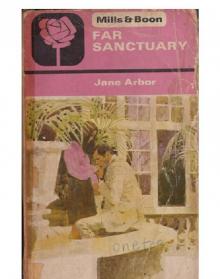 Far Sanctuary
Far Sanctuary Sandflower
Sandflower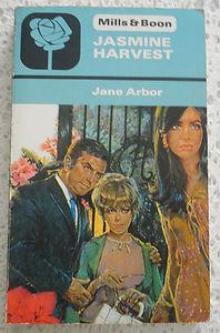 Jasmine Harvest
Jasmine Harvest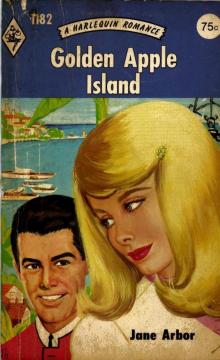 Golden Apple Island
Golden Apple Island Consulting Surgeon
Consulting Surgeon Pact without desire
Pact without desire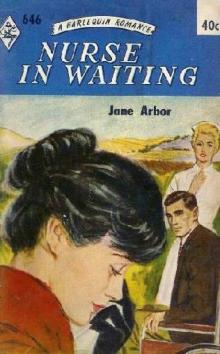 Nurse in Waiting
Nurse in Waiting Wildfire Quest
Wildfire Quest Roman Summer
Roman Summer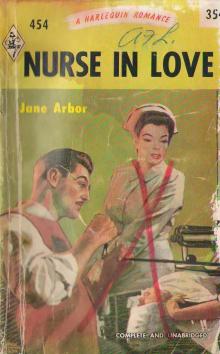 Nurse in Love
Nurse in Love Doctor's Love
Doctor's Love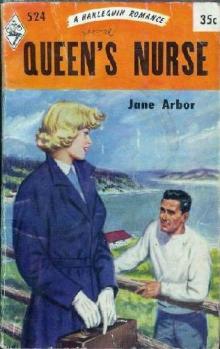 Queen's Nurse
Queen's Nurse Meet the Sun Halfway
Meet the Sun Halfway The Cypress Garden
The Cypress Garden Kingfisher Tide
Kingfisher Tide A Growing Moon
A Growing Moon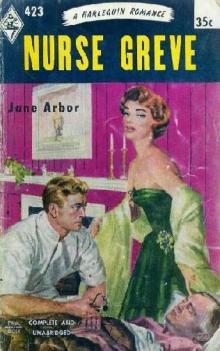 Nurse Greve
Nurse Greve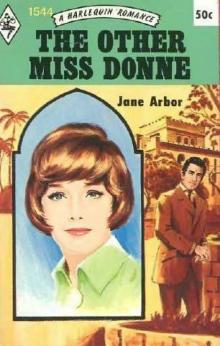 The Other Miss Donne
The Other Miss Donne